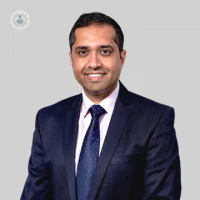Sleep aponea: an expert guide
Written in association with:Sleep apnoea is a condition where children experience pauses in their breathing during sleep, often accompanied by gasping or coughing. One common form, obstructive sleep apnoea (OSA), occurs due to blockages in the airway, frequently caused by enlarged tonsils and adenoids.
Leading consultant ENT surgeon Mr Amit Parmar provides a guide to sleep apnoea in children, including symptoms, diagnosis, treatment options and lifestyle changes.

What are the common symptoms of sleep aponea in children?
Sleep aponea is a condition where children have pauses in their sleep. They can also gasp or cough for breath.
There is a form of sleep apnoea know as obstruction sleep apnoea (OSA ) – this is where the sleep apnoea is caused by an obstruction, often this is caused by large tonsils in the mouth and adenoids at the back of the nose.
With obstructive sleep apnoea the child may have any of these symptoms, Snoring, disturbed sleep, restless sleep, waking up at night, gasping and coughing, sleeping upright, sweating, frothing and headaches. During the day the child may be tired, hyperactive or irritable
How is sleep apnoea diagnosed in children?
Obstructive sleep apnoea can be diagnosed by taking a detailed history and undergoing a careful ENT examination. During the examination the oral cavity will be examined for the size and obstructive nature of the tonsils, the position of the tongue and jaw. A nasal examination will help to determine the size of the nasal turbinate’s, shape of the septum and provide an assessment of the level of nasal obstruction.
In certain circumstances a sleep study may help in the diagnosis of OSA.
What are the treatment options for sleep apnoea in children?
The treatment depends on how long the symptoms have been present for, how old the child is and what the cause of the obstructive sleep apnoea is?
In cases where the obstructive sleep aponea hasn’t improved with time the child may benefit from surgery on their tonsils and adenoids. There are various surgical approaches for surgery such as co-ablation and bipolar. Laser tonsillectomy in children should be avoided due to the increased risk of bleeding.
Can sleep apnoea in children affect their behaviour and learning?
There is significant research which shows that obstructive sleep apnoea effects day time behaviour. Having interrupted sleep prevents children from being rested by disturbing their REM sleep. REM sleep is essential and the most important phase of sleep for development.
Having disturbed sleep results in a child who is tired and irritable, which can also present as hyperactivity. Being tired can affect learning and education development. Many years of untreated Obstructive sleep apnoea can also result in pulmonary hypertension and cardiac strain
Are there any lifestyle changes that can help manage sleep aponea in children?
In some cases where sleep aponea is caused by being overweight. A programme of weight loss can result in an improvement in symptoms.
If you would like to book a consultation with Mr Parmar, do not hesitate to do so by visiting his Top Doctors profile today.


